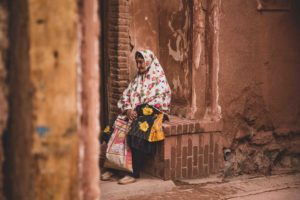Ain’t Nothin Sweeter
Most Friday mornings I conduct the weekly Bible Study in the Reminiscence (Alzheimer’s) Neighborhood at Sunrise Senior Living at Pinehurst against a backdrop of myriad sounds – telephone calls, light housekeeping and conversation over coffee. I adjust my volume accordingly and do my best to keep my residents focused for the short time we are together. It’s a challenge to be sure.
 I’ve learned not to take offense when ¾ of my congregation falls asleep. Sometimes a comment is made or a question is asked that has nothing to do with the topic at hand. Often someone wanders into the circle and stands, blocking my view. They make me smile.
I’ve learned not to take offense when ¾ of my congregation falls asleep. Sometimes a comment is made or a question is asked that has nothing to do with the topic at hand. Often someone wanders into the circle and stands, blocking my view. They make me smile.
Our topic this morning is prayer. I want to address it in such a way that it will be meaningful even if it is only remembered for a second. For sure, five minutes after we conclude, they won’t recall a word I said or even that we were together. That’s okay. I’m learning to make the most of the moments.
Our study begins with a simple question, “What is prayer?” Mostly I’m met with blank stares though I can see the wheels turning in a few of their heads. Finally, Ms. Beatty, to my left, says, “It’s talking to God.” Bingo.
“That’s right, Ms. Beatty,” I smile, “Prayer is a conversation between two who love each other very much . . . God and you.”
“There are many aspects to prayer,” I quietly explain. “Worship, thanksgiving, confession, supplication, intercession.” The words are too complicated. In an attempt to bring it home we play a game. I point to my eyes, “When you are praying, what could you pray about your eyes?”
Ms. Beatty chimes in once again, “That I can see good.”
“Very good.” I encourage. “You could also ask God to help you to be careful to look at things that are good and wholesome for you.”
I lift my hands in the air and wiggle my fingers. They’re beginning to warm to the game – I can tell by the smiles on their faces. I ask the question over and over again, “And what could you pray in relation to your __________ (arms, feet, ears, lips)?”
I point to the corresponding body part as I say the word. I remind them, as I run out of parts to point to, that God knows them and loves them. I pat my toosh and I say, “He knows when you sit.” I stand to my feet, “He knows when you stand.” I pat my head, “He knows the number of the hairs on your head. You matter to Him.”
It’s time to bring our time together to a close. Worship is expressing reverence and adoration to God. That seems like an appropriate way to end. “Let’s sing a song of worship to God, I say. This song only has one word and it’s ‘Hallelujah.’ Say it with me.” They say it with me, “Hallelujah.” I am encouraged. Only one resident is asleep – one out of nine is good.
I glance at the faces in the circle and realize that they are really with me even Peg who has sat quietly all through the study. The twenty minutes we have spent together has been meaningful to me. I start singing and to my surprise, everyone awake joins in, “Hallelujah. Hallelujah.” The melody is simple; easy on the ear. We sing it once, and then we sing it again. Third time through, as if by common agreement, everyone quiets and Peg sings all by herself.
At 103 her voice is wobbly but strong. She’s got the tune down pat, “Hallelujah, hallelujah.” An amiable silence settles over the neighborhood. There’s no one on the phone, no secondary conversations, no vacuum down the hall, just sweet peace. You could have heard a pin drop. I make eye contact with my volunteer then co-worker and we smile. What a perfect ending to our time together.
Scripture tells us that God inhabits the praises of His people. I’m thinking that at that moment He smiled, and said out loud to no one in particular, “Hear that? Ain’t nothin’ sweeter.”
